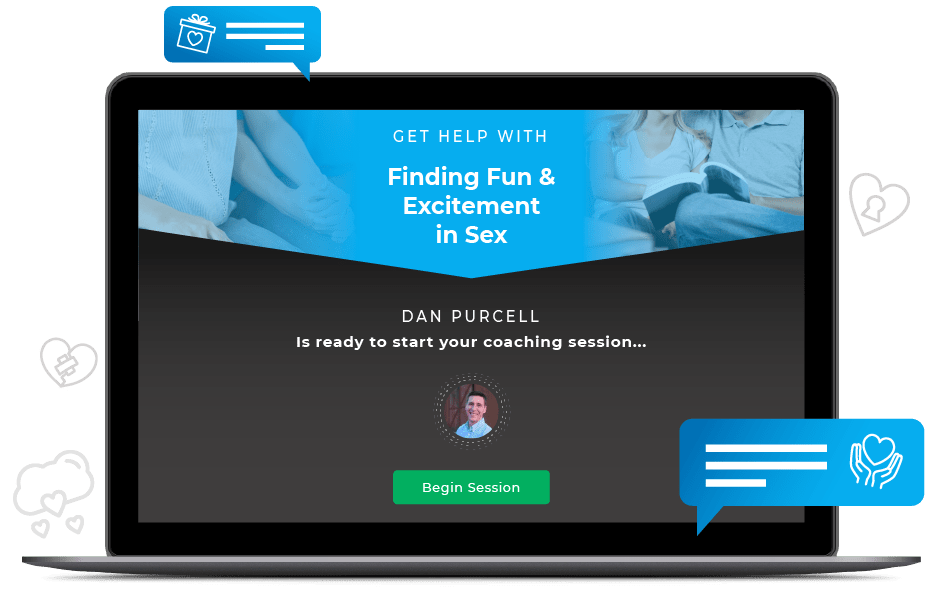It’s a typical evening in my apartment. I am working until 10 pm, when my husband finally gets home. I’ve been sitting at my laptop, writing this blog, and I want to practice what I’m preaching ;). I give my husband a big hug, but then beat around the bush.
“What do you want to do tonight? We could chat or watch a show… or have sex…”
He chooses a chat, and I say okay. But inside, I feel heartbroken that I won’t get to have sex tonight. As situations like this build up, I may freak out on him and accuse him of not meeting my needs.

I get so frustrated with myself in these moments. Why can’t I come out and say what I want? Unfortunately, this kind of self-sabotage is often a stumbling block to our marriages. Many spouses find they self-sabotage by not directly asking for what they want, then feeling disappointed when they don’t get it. Let’s unpack why we do this and a better way to manage our disappointment.
What is Self-Sabotage?
Situations in which you anticipate rejection or hurt trigger many people to automatically react to protect themselves from future disappointment. This specifically can happen when you have been rejected in the past. To protect yourself, you subconsciously project that rejection into the future and anticipate it happening the next time that situation comes up.
When it comes to your relationship, self-sabotage is when you don’t give your spouse the chance to say no by not asking for what you want. You may convince yourself it’s not really that important, or that you will ask later, or that you simply know your spouse will say no. Either way, not speaking up means you don’t have to open yourself up to a possible rejection.

The problem with this strategy is that your needs don’t end up getting met. The lie we tell ourselves is that we can save ourselves from hurt, but you end up hurting yourself anyways. When you are too afraid to ask for what you want, you end up feeling rejected without even giving your spouse a chance to say yes.
Ending the Cycle
We tend to self-sabotage in areas we have previously been rejected in before. We take one “no” and multiply it into an “always no.” We project past disappointment into the future. We also self-sabotage by focusing on the things we can’t control, like how our spouse will respond to us. When this pattern repeats, we place the locus of control outside ourselves. We start to believe that we have no control over our own happiness and are reliant on our spouse to read our minds and meet our needs.
As my favorite fictional character says, “It is better to be an optimist than a pessimist. For if one is doomed to disappointment why experience it in advance?” (Elizabeth Peters in the Amelia Peabody series). We can change our mindset and regain control over our lives. Although we can’t protect ourselves from all feelings of rejection, we can choose to live in the present and focus on what we can control. In this way, we may still experience rejection but the long term will be so much more rewarding. Let’s talk about how to move to an inward locus of control, purposefully choose the positive, and shape our futures.
Moving to an Inward Locus of Control

As we go through life, we are always evaluating and judging the things that happen to us. Paul Jekins talked about this on our podcast. He conceptualized circumstances as neutral in that they could almost certainly always be worse, and they could always be better. Therefore, it is our perception that defines a situation as positive or negative. This isn’t to say that every situation could be positive; there are things like loss and abuse that are objectively painful and horrible situations to be in. However, it is Paul’s theory that our evaluation of events is directly linked to the future we create for ourselves.
In life, we can never control the actions of other people. When we focus too much on the actions of others, we start to believe we don’t have any control at all. Likewise, when we over focus on the negatives (like our spouse rejecting our bids for affection) we inadvertently create a more negative future for ourselves (by self-sabotaging). The first step is to recognize the effect we have on our futures. We can take back control by focusing on the positives of our situation and the things we can control in the present.
Creating a Space with Meta-Cognition
It can be hard to change long standing thought patterns. In order to take control of our futures, we need to first create space in our mind to make conscious decisions. Meta-cognition is the ability to think about our thoughts. To do this, we need to learn to slow down our thoughts through mindfulness. Mindfulness is the ability to recognize our thoughts and slow them down enough to allow for choice. Once we are aware of our thoughts and emotions, we now have the option to choose how to act on these thoughts and emotions. This is a skill that requires practice. To learn how to build more mindfulness, check out our blog post on the topic.
Shining Light on the Positives

Once you are aware of your thoughts, you can choose which to focus on! Unfortunately, we as people tend to focus on the negative. This may be an evolutionary trait, teaching us to remember things that hurt us so we can avoid them. However, in our modern world, focusing on the negatives means we don’t notice the things that are positive in our situation. We get trapped in a negative thought process that projects the hurt we feel into the future. Anxiety is when we worry about the future and judge what will happen based on past negative experiences. This is the result of focusing on the negative.
Oh the other hand, the positives go unnoticed until we learn to call attention to them. Once we learn how to be mindful, we can choose to become more aware of the things that are going well. Seeing the positives won’t take away the present pain, but it can help you develop a more positive attitude. That positive attitude will enable you to trust that the next situation doesn’t have to end like this one did.
Evaluation Leads to Creation
Lastly, I want to emphasize the idea that evaluation leads to creation. How we judge our circumstances, and the attitude we choose, will end up creating the future we expect. Although we can’t change the painful truths of the present, we can look for the positives and build on them. Focusing on the good will allow us to stop self-sabotaging and move into the future with courage. If you would like to learn more about this process, Check out Paul Jenkin’s work or listen to him on our podcast!
Written by Amanda Severson with Get Your Marriage On!





